人教版七年级下册英语语法
七年级下册英语全部语法知识点
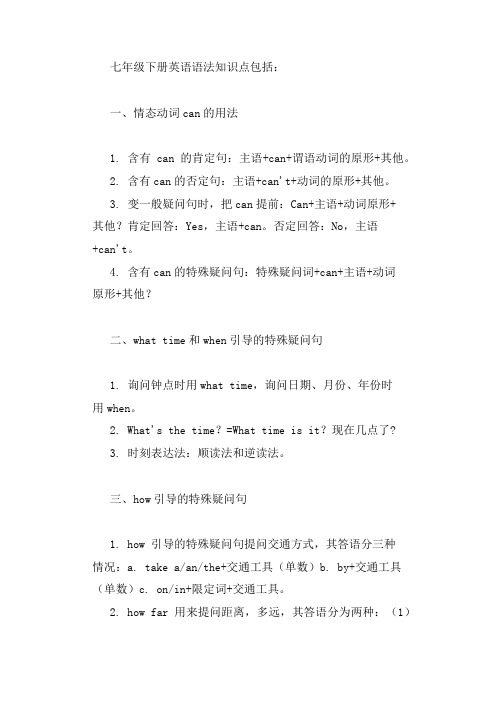
七年级下册英语语法知识点包括:一、情态动词can的用法1. 含有can的肯定句:主语+can+谓语动词的原形+其他。
2. 含有can的否定句:主语+can't+动词的原形+其他。
3. 变一般疑问句时,把can提前:Can+主语+动词原形+其他?肯定回答:Yes,主语+can。
否定回答:No,主语+can't。
4. 含有can的特殊疑问句:特殊疑问词+can+主语+动词原形+其他?二、what time和when引导的特殊疑问句1. 询问钟点时用what time,询问日期、月份、年份时用when。
2. What's the time?=What time is it?现在几点了?3. 时刻表达法:顺读法和逆读法。
三、how引导的特殊疑问句1. how 引导的特殊疑问句提问交通方式,其答语分三种情况:a. take a/an/the+交通工具(单数)b. by+交通工具(单数)c. on/in+限定词+交通工具。
2. how far 用来提问距离,多远,其答语分为两种:(1)用长度单位表示;(2)用时间表示。
3. how long 用来提问时间,意为多久,回答常用“for+段时间”。
4. how soon 用来提问做完某事还需要多长时间,用于将来时态,常用“in+时间段”来回答。
四、祈使句祈使句一般表示请求、命令、劝说、号召、警告等。
一般以动词原形开头,句末可以用感叹号或句号。
五、现在进行时现在进行时指当前时间正在发生的动作。
常与now,at this moment,listen,look等词连用。
人教版七年级下册英语Unit11单元语法知识点总结

人教版七年级下册英语Unit11单元语法知识点总结本单元重点短语的具体用法1. school trip:学校旅行。
例如:We had a great school trip to the museum.(我们去博物馆的学校旅行非常棒。
)2. go for a walk:去散步。
例如:I like to go for a walk in the park after dinner.(我喜欢晚饭后去公园散步。
)3. milk a cow:挤牛奶。
例如:Did you ever milk a cow before?(你以前挤过牛奶吗?)4. ride a horse:骑马。
例如:She enjoys riding a horse on the weekends.(她喜欢在周末骑马。
)5. feed chickens:喂鸡。
例如:My grandpa feeds chickens every morning.(我爷爷每天早上喂鸡。
)6. talk with a farmer:与农民交谈。
例如:I had a interesting talk with a farmer about farming.(我与一位农民进行了关于农业的有趣交谈。
)7. take some photos:照相。
例如:Let's take some photos to remember this moment.(让我们照些相来记住这一刻。
)8. ask some questions:问一些问题。
例如:He always asks some questions in class.(他总是在课堂上问一些问题。
)9. grow apples:种苹果。
例如:They grow apples in their orchard.(他们在果园里种苹果。
)10. show sb. around sp.:带某人逛某地。
例如:The guide showed us around the city.(导游带我们逛了这座城市。
完整版)新人教版七年级下册英语语法大全

完整版)新人教版七年级下册英语语法大全Please find below the revised and edited n of the article:New n n | All Grammar of Grade 7 English is Here。
Mastered in 15 Minutes!I。
Usage of Modal Verb "Can"Can + verb infinitive does not change with the subject's person or number.1.Affirmative sentence with "can": Subject + can + verb infinitive + others.2.Negative sentence with "can": Subject + can't + verb infinitive + others.3.To make a general n。
move "can" to the beginning: Can + subject + verb infinitive + others。
Positive answer: Yes。
subject + can。
Negative answer: No。
subject + can't.4.Special n with "can": interrogative word + can + subject + verb infinitive + others。
Example: I can speak English。
→ I can'tspeak English。
→ Can you speak English。
→ What can you speak?II。
人教版七年级下册英语Unit 10 语法知识归纳
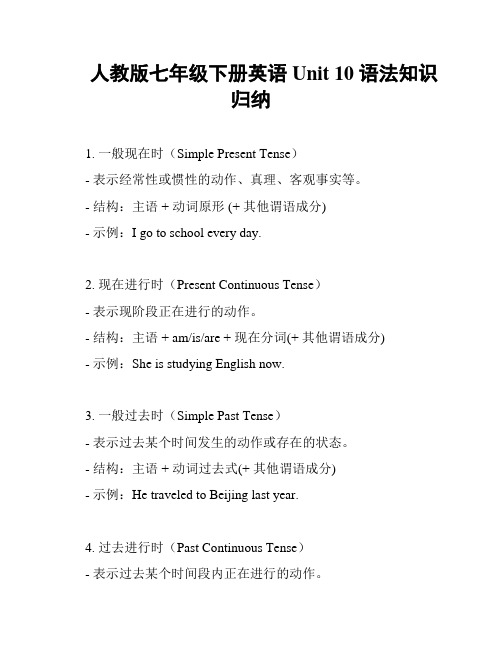
人教版七年级下册英语Unit 10 语法知识归纳1. 一般现在时(Simple Present Tense)- 表示经常性或惯性的动作、真理、客观事实等。
- 结构:主语 + 动词原形 (+ 其他谓语成分)- 示例:I go to school every day.2. 现在进行时(Present Continuous Tense)- 表示现阶段正在进行的动作。
- 结构:主语 + am/is/are + 现在分词(+ 其他谓语成分)- 示例:She is studying English now.3. 一般过去时(Simple Past Tense)- 表示过去某个时间发生的动作或存在的状态。
- 结构:主语 + 动词过去式(+ 其他谓语成分)- 示例:He traveled to Beijing last year.4. 过去进行时(Past Continuous Tense)- 表示过去某个时间段内正在进行的动作。
- 结构:主语 + was/were + 现在分词(+ 其他谓语成分)- 示例:They were playing basketball yesterday.5. 将来时(Future Tense)- 表示将来会发生的动作或存在的状态。
- 结构:主语 + will + 动词原形(+ 其他谓语成分)- 示例:We will have a party next week.6. 助动词的用法- “do”及其变化形式可用于否定句、疑问句和强调句。
- “be”用于进行时态和被动语态。
- “have”可用于完成时态。
- 示例:She doesn't like swimming. Did you go to the park? I do like chocolate.7. 特殊疑问词的用法- 针对特定方面的问题,使用特殊疑问词进行提问。
- 示例:What is your favorite color? Where did you go on vacation?以上是人教版七年级下册英语Unit 10关于语法知识的归纳。
人教版七年级下册英语语法总结

人教版七年级下册英语语法总结Unit 1 Can you play the guitar ?语法聚焦❖情态动词can的用法→can+动词原形,它不随主语的人称和数而变化。
(1)can的用法He can speak English. 他会说英语。
(2)can的句式变化—Can you play chess?你会下象棋吗?—Yes, I can. 是的,我会。
(肯定回答)—No, I can’t. 不,我不会。
(否定回答)Unit 2 What time do you go to school ?语法聚焦(1)时间表达法(2)what time/when引导的特殊疑问句→ 结构:What time+do/does+主语+动词原形+其它Unit 3 How do you get to school?语法聚焦(1)how及由how构成的特殊疑问句(2)how构成的其它特殊疑问词组❖how old how much how manyUnit 4 Don’t eat in class.语法聚焦(1)祈使句:用来发出命令或指示,提出要求、建议、劝告等的句子(2)情态动词Unit 5 Why do you like pandas?语法聚焦(1)Why, what, where引导的特殊疑问句(2)拓展:because❖because表示“因为”,so表示“所以”,但是两个句子不能同时出现在一个句子中,二者用其一即可。
例:Because I am free today,so I can go to the zoo. (×)I am free today,so I can go to the zoo. (√)Because I am free today, I can go to the zoo. (√)❖because后面要加句子,而because of 后面加名词(短语)、代词等。
Unit 6 I’m watching TV.语法聚焦: 现在进行时(1)概念和基本结构(2)现在分词的变化规律拓展:重读闭音节(3)现在进行时的句式变化(4)常和现在进行时搭配的词或短语有now, at the moment,还有警示语“Look!"或“Listen!"等。
人教版七年级英语下册重点短语总汇,语法总结

人教版七年级英语下册重点短语总汇,语法总结人教版七年级英语下册重点短语总汇,语法总结各单元知识概要Unit 1 here’s ur pen pal fr?一、词组be fr= e fr 自pen pal=pen friend 笔友lie and dislie 好恶;爱憎live in…在居住spea English 讲英语pla sprts 做体育运动a little Frenh 一些法语g t the vies 去看电影an atin vie 一部动作片n eeends 在周末Exuse e 对不起,打扰get t 到达、抵达beginning f 在开始的时候at the end f 在结束的时候arrive at /二、句型(1)、here主+be+主语+fr?主语+be+fr+地点(2)、here d/des+主语+live?主语+live/lives in…(3)、hat language d/des +主语+spea? 主语+spea/speas…(4)、主语+lie/lies+ding…三、日常交际用语1-here is ur pen pal fr?-He’s fr hina2-here des she live?--She lives in T3-Des she spea English?-es,she des/N,she dsen’t4-Is that ur ne pen pal?-es,he is /N,he isn’t-hat language des she spea?-She speas EnglishUnit 2 here’s the pst ffie一、词组pst ffie 邮局pa phne 投币式公用电话next t 在隔壁arss fr 在对面in frnt f 在前面beteen…and… 在和之间n a street 在街上in the neighbrhd 在附近n the right/left 在右边/在左边n ne’s right/left 在某人的右边/左边turn right/left 向右/左转tae a al 散步have fun 玩得开心the a t …去的路tae a taxi 打的/乘出租车g dn(alng)…沿着走g thrugh穿过have a gd trip 旅途愉快二、句型(1)、Is there a ban near here?es,there is It’s n entre StreetN,there isn’t(2)、here’s the superaret?It’s next t the librar(3)、Bridge Street is a gd plae t have fun(4)、I hpe u have a gd trip()、If u are hungr,u an bu fd in the restaurant(6)、Tal a al thugh the par(7)、en后接名词或动词-ing形式D u en(=lie) ur r?D u en(=lie) living in the it?三、日常交际用语(1)、Is there a …?句型Eg:-Exuse eIs there a htel in the neighbrhd-es, there is Nthere isn’t(2)、here is …?句型Eg:-here is the par,please?-It’s behind the ban(肯定回答)-I’srr I dn’t n (否定回答)(3)、hih is the a t +地点? 句型例如:- hih is the a t the librar(4)、H an I get t +地点?句型例如:-H an I get t the restaurant?()、an u tell e the a t +地点?句型例- an u tell e the a t the pst ffie?(6)、Let e tell u the a t huse(7)、ust g straight and turn leftUnit 3 h d u lie alas?一、词组ant t d sth 想要做某事ant sb t d sth 想要某做某事ant sth 想要某物Let sb d sth 让某人做某事ind f 有几分\种类a ind f 一种……ears ld …年龄如:ten ears ld 十岁lie t d sth 喜欢做某事lie ding sthpla ith … 与一起玩be quiet 安静during the da 在白天at night 在夜间have a l at 看ne…the ther 一个另一个二、句型(1)、-h d u lie pandas?-Beause the’re ver ure(2)、-h dse he lie alas?-Beause the are ind f interesting(3)、-here are lins fr?-Lins are fr Suth Afria(4)、-hat anials d u lie?-I lie elephants三、日常交际用语(1)、-Let’s see the lins(2)-h d u ant t see the lins?-Bease the are ver ute(3)-D u lie giraffes?es,I d/ N,I dn’t(4)-hat ther anial d u lie?_I lie dgstther+ 名词的复数表示没有特定的数量范围the ther+名词的复数表示有特定的数量范围()-h are u ling at e? -Beause u are ver ute(6)-Let us pla gaes –Great!Let e seeUnit 4 I ant t be an atr一、词组ant t be+职业想要成为。
人教版英语七年级下册语法归纳习题及答案
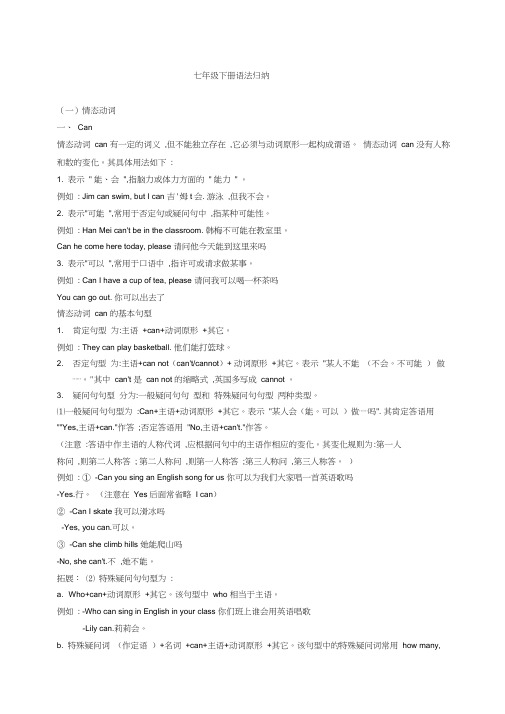
七年级下册语法归纳(一)情态动词一、Can情态动词can 有一定的词义,但不能独立存在,它必须与动词原形一起构成谓语。
情态动词can 没有人称和数的变化。
其具体用法如下:1. 表示" 能、会",指脑力或体力方面的" 能力" 。
例如: Jim can swim, but I can 吉'姆t会. 游泳,但我不会。
2. 表示"可能",常用于否定句或疑问句中,指某种可能性。
例如: Han Mei can't be in the classroom. 韩梅不可能在教室里。
Can he come here today, please 请问他今天能到这里来吗3. 表示"可以",常用于口语中,指许可或请求做某事。
例如: Can I have a cup of tea, please 请问我可以喝一杯茶吗You can go out. 你可以出去了情态动词can 的基本句型1. 肯定句型为:主语+can+动词原形+其它。
例如: They can play basketball. 他们能打篮球。
2. 否定句型为:主语+can not(can't/cannot)+ 动词原形+其它。
表示"某人不能(不会。
不可能)做⋯⋯。
"其中can't 是can not 的缩略式,英国多写成cannot 。
3. 疑问句句型分为:一般疑问句句型和特殊疑问句句型两种类型。
⑴一般疑问句句型为:Can+主语+动词原形+其它。
表示"某人会(能。
可以)做⋯⋯吗". 其肯定答语用""Yes,主语+can."作答;否定答语用"No,主语+can't."作答。
(注意:答语中作主语的人称代词,应根据问句中的主语作相应的变化。
其变化规则为:第一人称问,则第二人称答; 第二人称问,则第一人称答;第三人称问,第三人称答。
期末复习人教版英语七年级下册单元重点知识点语法汇总

人教版七年级下册-单元重点语法汇总U1情态动词can的用法can是情态动词,意为“能,会”,表示某人或某物具备的能力,还可用来提出请求,没有人称和数的变化,后面直接接动词原形。
下面学习情态动词can的常见用法。
1.表示“能力”,意为“能,会”。
例句:I can speak English.我会讲英语。
2.表示“请求”或“许可”。
例句:Can you help me with my Chinese?你能帮我学汉语吗?You can go to the park after you finish your homework.你做完作业后可以去公园。
3.含有情态动词can的肯定句变否定句时,需在can后加not,其缩写形式为can’t;变疑问句时,情态动词can直接放在句首,构成一般疑问句。
例句:I can sing English songs.我会唱英文歌。
(肯定句)→I can’t sing English songs.我不会唱英文歌。
(否定句)Yao Ming can play basketball.姚明会打篮球。
→Can Yao Ming play basketball?姚明会打篮球吗?(一般疑问句)4.对Can…问句的回答可以用下面几种形式:对询问能力的问句的回答可以说“Yes,…can.”或“No,…can’t.”,表示对能力的肯定或否定;对表示请求的问句的回答可以说“OK./All right.”,表示同意对方的请求。
也可用certainly或sorry来回答。
用certainly作肯定回答,语气更肯定;用sorry作否定回答,语气则更委婉、客气。
例句:—Can you speak English?你会说英语吗?—Yes,I can.是的,我会。
—Can I see your pencil-box,please?请问,我可以看一下你的铅笔盒吗?—All right./Certainly.Here you are.可以。
人教版七年级英语下册重点短语及语法梳理

Unit1 Can you play the guitar?【重点短语】1. play the guitar 弹吉他2. play chess 下棋3. speak English 说英语3. what to do sth 想做某事4. join the music club 参加音乐俱乐部5. match…..with 与……匹配6. the swimming club 游泳俱乐部7. what club 什么俱乐部8. a sports club 一个体育俱乐部10. be good at telling stories 擅长讲故事11. the story telling club 讲故事俱乐部12. like to do/doing sth 喜欢做某事13. let’s join 让我们参加......14. sound good 听起来不错15. students wanted for School Show 学校表演招聘学生16. talk to/with sb 跟某人谈话17. after school 放学后18. do kung fu表演功夫练功夫19. show sb. sth.=show sth. to sb. 把某物展示给某人20. play games with people 和人们做游戏21.be in the school music club 在学校音乐俱乐部22. help for old people 对老人的援助23. be good with… 和某人相处得好,特长和..打交道24. be free / be busy 空闲的/忙的25. in July 在六月份26. tell sb. stories 给某人讲故事27. make frie nds with… 和某人交朋友28. call sb. at …… 给某人打……29. on the weekend 在周末30. help sb.〔to〕do sth. 援助某人做某事31. help sb. with sth. 在某方面援助某人32. English-speaking students 说英语的学生33. It is+adj +〔for sb〕to sth. 做某事〔对于某人来说〕是…..34. play the piano 弹钢琴35. play the violin 拉小提琴36. the Students’ Sports Center学生运动中心37. need help to teach music 需要援助来做某事38. need sb. to do sth 需要某人做某事39. teach sb. to do sth 教某人做某事40. be in our school music festival 参加我们学校的音乐节Unit2 What time do you go to school?【重点短语】1. go to school 去上学2. get up 起床3. get dressed 穿衣服4. brush teeth 刷牙5. eat breakfast 吃早饭6. take a shower 洗澡7. what time 什么时间8. at six forty 在六点四十9. an interesting job 一个有趣的工作10. at the radio station 在播送电视台11. usually /always/ often/ sometimes/ never 经常/总是/经常/有时/从不12. your radio show 你的播送节目13. from …..to 从….到…..14. at night 在夜晚15. a funny time 一个有趣的时间16. take exercise 锻炼17. be late for….. 因… 迟到18. at about ten twenty 在大约十点二十19. on weekends 在周末20. on school days 在上学日21. half past six 六点半22. a quarter past three 三点过一刻〔3:15〕23. a quarter to ten 十点差一刻〔9:45〕24. do 〔one’s〕homework 做〔某人的〕家庭作业25. take a walk 散步26. go to bed 睡觉27. eat quickly 吃得快28. have much time 有许多时间29. half an hour 半个小时30. get home 到达家31. either…..or 或者…….或者...... 32. eat a good breakfast 好好吃顿早餐33. lots of = a lot of 许多34. be good for….. 对…….有益35. taste good 尝起来好36. do her homework 做她的家庭作业37. have a healthy life 有一个健康的生活方式38. have dinner 吃晚饭Unit3 How do you get to school?【重点短语】1. get to school 到达学校2. take the train 乘火车3. take the subway 乘地铁4. ride a bike 骑自行车5. how do you get to school 怎么到达学校6. one hundred and five 1057. how far 多远8. how long 多长时间9. it takes sb some time to do sth 它花费某人多长时间做某事10. ride the bike to school 骑自行车到学校11. walk to , drive to ,fly to…步行去…;开车去…;坐飞机去….12. every day 每天13. I’m not sure 我不敢确信14. about= around 大约15. 10 kilometers 十公里16. good exercise 好的锻炼17. drive his car to work 开车去上班18. in his father’s car 坐父亲的车19. need about 10 minutes to get to school 需要十分钟的时间到达学校20. what do you think of=how do you like你觉得怎么样21. cross the river 过河22. It is easy to get to school. 到达学校很简单。
人教版初一英语下册知识点

人教版初一英语下册知识点
以下是初一英语下册部分重点知识点:
1. 一般现在时:表示经常或习惯性的动作或状态,常与always, usually, often, sometimes, every day 等时间状语连用。
2. 现在进行时:表示现在正在进行的动作或状态,常与now, at the moment, Look! Listen! 等时间状语连用。
3. 一般过去时:表示过去某个时间发生的动作或状态,常与yesterday, last week, in 2000 等时间状语连用。
4. 祈使句:用于表达请求、命令、建议或劝告等,通常以动词原形开头,句末用句号或感叹号。
5. There be 句型:表示“某地有某物”,其中be 动词的形式根据主语的单复数形式而定。
6. 形容词和副词的比较级和最高级:用于比较两个或两个以上的人或事物,比较级用于两者之间的比较,最高级用于三者或三者以上的比较。
7. 情态动词:表示能力、可能性、请求、建议、许可等,如can, could, may, might, must, have to 等。
人教版七年级英语下册单词,短语,句型,语法总结
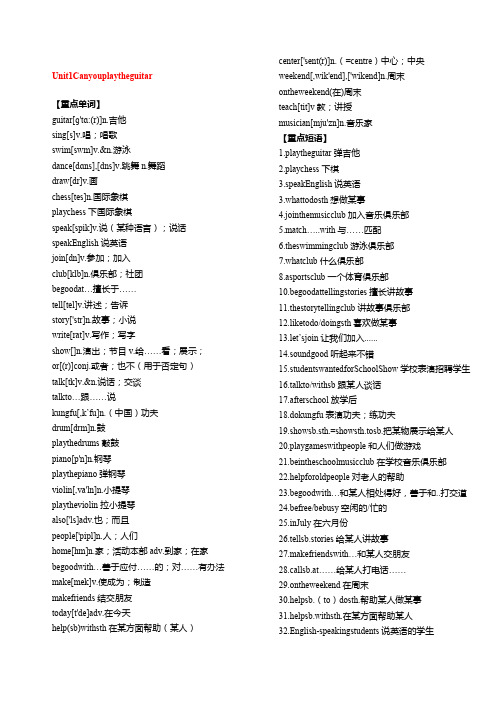
Unit1Canyouplaytheguitar【重点单词】guitar[ɡ'tɑ:(r)]n.吉他sing[s]v.唱;唱歌swim[swm]v.&n.游泳dance[dɑns],[dns]v.跳舞n.舞蹈draw[dr]v.画chess[tes]n.国际象棋playchess下国际象棋speak[spik]v.说(某种语言);说话speakEnglish说英语join[dn]v.参加;加入club[klb]n.俱乐部;社团begoodat…擅长于……tell[tel]v.讲述;告诉story['str]n.故事;小说write[rat]v.写作;写字show[]n.演出;节目v.给……看;展示;or[(r)]conj.或者;也不(用于否定句)talk[tk]v.&n.说话;交谈talkto…跟……说kungfu[,k’fu]n.(中国)功夫drum[drm]n.鼓playthedrums敲鼓piano[p'n]n.钢琴playthepiano弹钢琴violin[,va'ln]n.小提琴playtheviolin拉小提琴also['ls]adv.也;而且people['pipl]n.人;人们home[hm]n.家;活动本部adv.到家;在家begoodwith…善于应付……的;对……有办法make[mek]v.使成为;制造makefriends结交朋友today[t'de]adv.在今天help(sb)withsth在某方面帮助(某人)center['sent(r)]n.(=centre)中心;中央weekend[,wik'end],['wikend]n.周末ontheweekend(在)周末teach[tit]v教;讲授musician[mju'zn]n.音乐家【重点短语】1.playtheguitar弹吉他2.playchess下棋3.speakEnglish说英语3.whattodosth想做某事4.jointhemusicclub加入音乐俱乐部5.match…..with与……匹配6.theswimmingclub游泳俱乐部7.whatclub什么俱乐部8.asportsclub一个体育俱乐部10.begoodattellingstories擅长讲故事11.thestorytellingclub讲故事俱乐部12.liketodo/doingsth喜欢做某事13.let’sjoin让我们加入......14.soundgood听起来不错15.studentswantedforSchoolShow学校表演招聘学生16.talkto/withsb跟某人谈话17.afterschool放学后18.dokungfu表演功夫;练功夫19.showsb.sth.=showsth.tosb.把某物展示给某人20.playgameswithpeople和人们做游戏21.beintheschoolmusicclub在学校音乐俱乐部22.helpforoldpeople对老人的帮助23.begoodwith…和某人相处得好,善于和..打交道24.befree/bebusy空闲的/忙的25.inJuly在六月份26.tellsb.stories给某人讲故事27.makefriendswith…和某人交朋友28.callsb.at……给某人打电话……29.ontheweekend在周末30.helpsb.(to)dosth.帮助某人做某事31.helpsb.withsth.在某方面帮助某人32.English-speakingstudents说英语的学生33.Itis+adj+(forsb)tosth.做某事(对于某人来说)是…..34.playthepiano弹钢琴35.playtheviolin拉小提琴36.theStudents’SportsCenter学生运动中心37.needhelptoteachmusic需要帮助来做某事38.needsb.todosth需要某人做某事39.teachsb.todosth教某人做某事40.beinourschoolmusicfestival参加我们学校的音乐节【重点句型】1.—Canyouswim你会游泳吗?—No,Ican’t.不,我不会。
人教版英语七年级下册各单元重要语法内容

一、动词的一般现在时人教版英语七年级下册的重要语法内容之一为动词的一般现在时。
在学习动词的一般现在时时,学生需要掌握动词的三单特殊变化规则,即在第三人称单数时,动词需要在词尾加上-s或-es。
学生还需要学习动词的否定形式和疑问形式的构成方法,以及常见的一般现在时的时间状语如often, usually, always等的用法。
二、名词的单数和复数形式另一个重要的语法内容是名词的单数和复数形式。
学生需要了解名词单数和复数形式的规则,掌握常见的名词复数变化规则,如在词尾加上-s, -es, -ies等。
学生还要熟练掌握一些不规则名词的复数形式,如man-men, woman-women等。
三、形容词的比较级和最高级形容词的比较级和最高级也是七年级下册的重要语法内容之一。
学生需要学习形容词比较级的构成方法以及常见的比较级形式,如比较级+than, more+形容词等。
学生还需要了解形容词最高级的构成方法以及常见的最高级形式,如the+形容词最高级, most+形容词等。
四、介词的基本用法介词是英语中一个重要的语法内容,学生需要掌握介词的基本用法,包括介词表示地点、时间、方向、原因等的用法,以及介词与动词、名词、形容词的搭配。
学生还需要学习一些常用介词的用法,如in, on, under, behind, between等。
五、情态动词情态动词是七年级下册的另一个重要语法内容。
学生需要了解情态动词can, could, may, might, must, shall, should, will, would等的用法和意义,并能正确运用这些情态动词进行句子的构成。
学生还需要学习情态动词的否定形式和疑问形式的构成方法。
六、并列连词和从属连词七年级下册还包括并列连词和从属连词的学习。
学生需要了解并掌握一些常见的并列连词如and, but, or等的用法,以及从属连词如because, when, if, although等的用法。
人教版七年级下册英语Unit8单元语法知识点总结
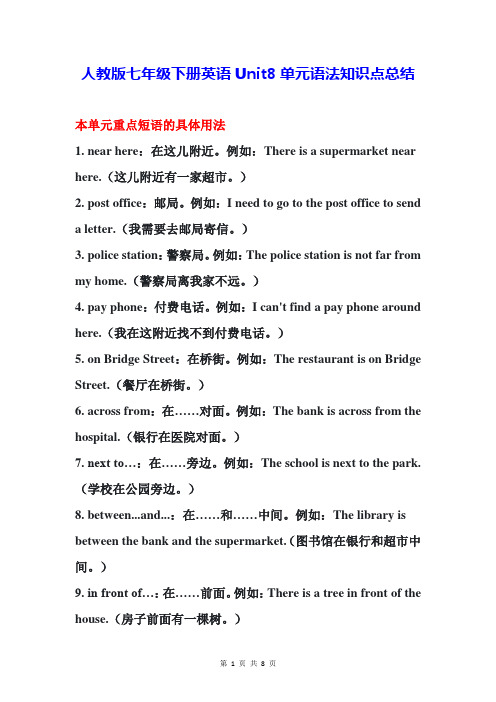
人教版七年级下册英语Unit8单元语法知识点总结本单元重点短语的具体用法1. near here:在这儿附近。
例如:There is a supermarket near here.(这儿附近有一家超市。
)2. post office:邮局。
例如:I need to go to the post office to senda letter.(我需要去邮局寄信。
)3. police station:警察局。
例如:The police station is not far from my home.(警察局离我家不远。
)4. pay phone:付费电话。
例如:I can't find a pay phone around here.(我在这附近找不到付费电话。
)5. on Bridge Street:在桥街。
例如:The restaurant is on Bridge Street.(餐厅在桥街。
)6. across from:在……对面。
例如:The bank is across from the hospital.(银行在医院对面。
)7. next to…:在……旁边。
例如:The school is next to the park.(学校在公园旁边。
)8. between...and...:在……和……中间。
例如:The library is between the bank and the supermarket.(图书馆在银行和超市中间。
)9. in front of…:在……前面。
例如:There is a tree in front of the house.(房子前面有一棵树。
)10. behind…:在……后面。
例如:The car is parked behind the building.(汽车停在建筑物后面。
)11. on Center Street:在中心街。
人教版七年级下册英语Unit12单元语法知识点总结

人教版七年级下册英语Unit12单元语法知识点总结本单元重点短语的具体用法1. Last weekend:用于描述过去的时间,通常在句子中作时间状语。
例如:I went shopping last weekend.(我上周末去购物了。
)2. Do one's homework:表示做作业。
例如:I need to do my homework before going out.(我需要在出去之前做作业。
)3. Go to the cinema:去看电影。
例如:They decided to go to the cinema instead of staying at home.(他们决定去电影院而不是待在家里。
)4. Go boating:去划船。
例如:We went boating on the lake and had a great time.(我们在湖上划船,玩得很开心。
)5. Camp by the lake:在湖边露营。
例如:They camped by the lake and enjoyed the beautiful scenery.(他们在湖边露营,欣赏美丽的风景。
)6. Go to the beach:去海滩。
例如:I like to go to the beach to relax.(我喜欢去海滩放松。
)7. Play badminton:打羽毛球。
例如:They played badminton in the park.(他们在公园里打羽毛球。
)8. On Saturday morning:在周六的早上。
例如:On Saturday morning, I usually sleep in.(在周六的早上,我通常会睡懒觉。
)9. Study for the English test:为英语考试学习。
例如:I have to study for the English test tomorrow.(我必须为明天的英语考试学习。
人教版初中英语七年级下册全册各单元知识点和语法归纳整理
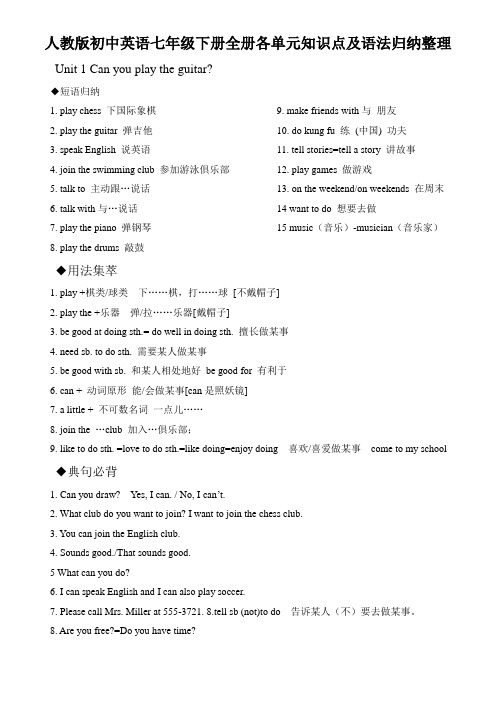
人教版初中英语七年级下册全册各单元知识点及语法归纳整理Unit 1 Can you play the guitar?◆短语归纳1. play chess 下国际象棋2. play the guitar 弹吉他3. speak English 说英语4. join the swimming club 参加游泳俱乐部5. talk to 主动跟…说话6. talk with与…说话7. play the piano 弹钢琴8. play the drums 敲鼓9. make friends with与朋友10. do kung fu 练(中国) 功夫11. tell stories=tell a story 讲故事12. play games 做游戏13. on the weekend/on weekends 在周末14 want to do 想要去做15 music(音乐)-musician(音乐家)◆用法集萃1. play +棋类/球类下……棋,打……球[不戴帽子]2. play the +乐器弹/拉……乐器[戴帽子]3. be good at doing sth.= do well in doing sth. 擅长做某事4. need sb. to do sth. 需要某人做某事5. be good with sb. 和某人相处地好be good for 有利于6. can + 动词原形能/会做某事[can是照妖镜]7. a little + 不可数名词一点儿……8. join the …club 加入…俱乐部;9. like to do sth. =love to do sth.=like doing=enjoy doing 喜欢/喜爱做某事come to my school◆典句必背1. Can you draw? Yes, I can. / No, I can’t.2. What club do you want to join? I want to join the chess club.3. You can join the English club.4. Sounds good./That sounds good.5 What can you do?6. I can speak English and I can also play soccer.7. Please call Mrs. Miller at 555-3721. 8.tell sb (not)to do 告诉某人(不)要去做某事。
人教版七年级下册英语1-6单元语法要点

一般现在时表现在的状态或经常或习惯性的 动作 1.be 动词的一般现在时的句式: 肯定句:主语+be+n./adj.等。 2.实义动词的一般现在时句式 1)主语(I/We/You/They/两个以上)+实动原形+其他 eg:I like English.You are beautiful. 2)主语(He/She/It/一个人或物)+实动单三+其他 eg: He plays basketball every day. 3.一般现在时的常见标志词:always ,usually, often, sometimes, never, everyday erery morning, on weekends等。
swim- swimming shop- shopping get- getting run- running
cut- cutting sit- sitting
同义句转换
1.1)She goes to Shanghai on a train by _______ train = She goes to Shanghai______ takes to =She ______the train ______Shanghai. 2)Mr Smith takes a car to the library. by _______ car = Mr Smith goes to the library ______ In _____ his _____. car = Mr Smith goes to the library _____ 3)他步行去上学 :He _______ walks ________school. to on _________. foot =He goes to school _______ 4)He rides his bike to school every day. by _______every bike =He goes to school ______ day. 2. 汤姆每天步行回家需要半小时 It takes _____Tom half an hour _____ to _____to walk his home.
人教版七年级下册英语词组,语法大全
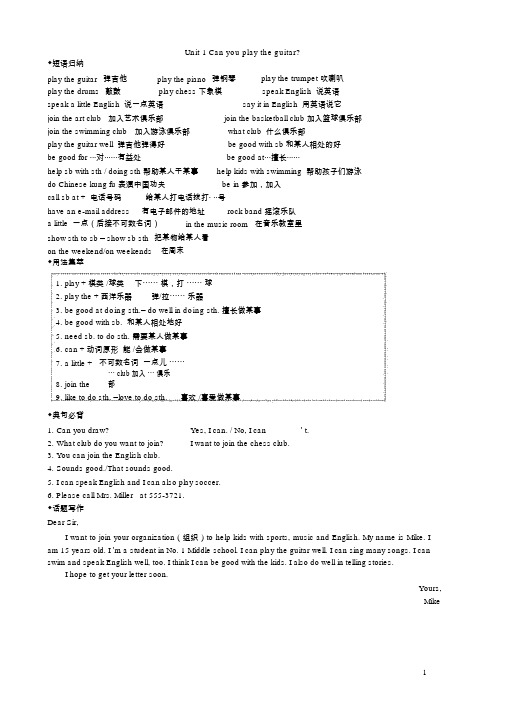
Unit 1 Can you play the guitar?◆短语归纳play the guitar弹吉他play the piano弹钢琴play the trumpet 吹喇叭play the drums敲鼓play chess 下象棋speak English 说英语speak a little English 说一点英语say it in English 用英语说它join the art club加入艺术俱乐部join the basketball club 加入篮球俱乐部join the swimming club加入游泳俱乐部what club 什么俱乐部play the guitar well 弹吉他弹得好be good with sb 和某人相处的好be good for ···对······有益处be good at···擅长······help sb with sth / doing sth 帮助某人干某事help kids with swimming 帮助孩子们游泳do Chinese kung fu 表演中国功夫be in 参加,加入call sb at + 电话号码给某人打电话拨打· ··号have an e-mail address有电子邮件的地址rock band 摇滚乐队a little 一点(后接不可数名词)in the music room在音乐教室里show sth to sb = show sb sth把某物给某人看on the weekend/on weekends在周末◆用法集萃1. play + 棋类 /球类下⋯⋯棋,打⋯⋯ 球2. play the + 西洋乐器弹/拉⋯⋯乐器3.be good at doing sth.= do well in doing sth. 擅长做某事4.be good with sb. 和某人相处地好5.need sb. to do sth. 需要某人做某事6.can + 动词原形能 /会做某事7. a little +不可数名词一点儿⋯⋯8. join the ⋯ club加入⋯俱乐部9. like to do sth. =love to do sth.喜欢 /喜爱做某事◆典句必背1.Can you draw?Yes, I can. / No, I can’ t.2.What club do you want to join?I want to join the chess club.3.You can join the English club.4.Sounds good./That sounds good.5.I can speak English and I can also play soccer.6. Please call Mrs. Miller at 555-3721.◆话题写作Dear Sir,I want to join your organization ( 组织 ) to help kids with sports, music and English. My name is Mike. I am 15 years old. I ’m a student in No. 1 Middle school. I can play the guitar well. I can sing many songs. I can swim and speak English well, too. I think I can be good with the kids. I also do well in telling stories.I hope to get your letter soon.Yours,Mike1Unit 2 What time do you go to school?◆短语归纳1. what time 几点2. go to school 去上学3. get up 起床4. take a shower 洗淋浴5. brush teeth 刷牙6. get to 到达7. do homework 做家庭作业8. go to work 去上班9. go home 回家10. eat breakfast 吃早饭11. get dressed 穿上衣服12. get home 到家13. either ⋯ or ⋯要么⋯要么⋯14. go to bed 上床睡觉15. in the morning/ afternoon/ evening 在上午 /下午 /晚上16. take a walk 散步17. lots of=a lot of 许多,大量18. radio station 广播电台19. at night 在晚上20. be late for=arrive late for 迟到◆用法集萃1. at + 具体时间点在几点(几分)2. eat breakfast/ lunch/dinner吃早饭 /午饭 /晚饭3. thirty\half past + 基数词⋯⋯点半4. fifteen\a quarter to + 基数词差一刻到⋯⋯ 点5. take a/an +名词从事⋯⋯活动6. from ⋯ to ⋯从⋯⋯到⋯⋯7. need to do sth需要做某事◆典句必背1. What time do you usually get up?I usually get up at six thirty.2. That ’ s a funny time for breakfast.3. When do students usually eat dinner?They usually eat dinner at a quarter to seven in the evening.4.In the evening, I either watch TV or play computer games.5.At twelve, she eats lots of fruit and vegetables for lunch..6.She knows it ’ s not good for her, but it tastes good.7.Here are your clothes.◆话题写作主题:谈论日常作息习惯My School DayI am a student. I usually get up at seven, and I eat breakfast at seven thirty. Then I go to school at eight. School starts at eight thirty. I eat lunch at twelve. I go home at 17:00. I often eat dinner at 19:00 and then play the piano. I do my homework at 20:00. At 22:00, I go to bed.2Unit 3 How do you get to school?◆短语归纳1. get to school 到达学校2. take the subway乘地铁3. ride a bike 骑自行车4. how far多远5. from home to school从家到学校6. every day 每天7. take the bus 乘公共汽车8. by bike 骑自行车9. bus stop 公共汽车站10. think of认为11. between⋯and⋯在⋯和⋯ 之间12. one 11-year-old boy一个11岁的男孩13. play with⋯和⋯玩14. come true 实现15. have to 不得不◆用法集萃1. take ⋯ to⋯= go to⋯by⋯乘⋯ 去⋯2. How do / does ( sb) get to⋯?⋯是怎样到⋯的?3. How far is it from⋯to⋯ ?从⋯ 到⋯ 有多远?4. It takes sb. some time to do sth.做某事花费某人多长时间。
人教版七年级英语下册单词短语句型语法总结

Unit1 Can you play the guitar【重点单词】guitar [ɡɪ'tɑ:(r)] n. 吉他sing [sɪŋ] v. 唱;唱歌swim [swɪm] v. & n. 游泳dance [dɑːns], [dæns] v. 跳舞 n. 舞蹈draw [drɔː] v. 画chess [tʃes] n. 国际象棋play chess 下国际象棋speak [spiːk] v. 说(某种语言);说话speak English 说英语join [dʒɔɪn] v. 参加;加入club [klʌb] n. 俱乐部;社团be good at… 擅长于……tell [tel ] v. 讲述;告诉story ['stɔːrɪ] n. 故事;小说write [raɪt] v. 写作;写字show [ʃəʊ] n. 演出;节目 v. 给……看;展示;or [ɔː(r)] conj. 或者;也不(用于否定句)talk [tɔːk] v. & n. 说话;交谈talk to … 跟……说kungfu [,kʌŋ’fuː] n.(中国)功夫drum [drʌm] n. 鼓play the drums 敲鼓piano [pɪ'ænəʊ] n. 钢琴play the piano 弹钢琴violin [,vaɪə'lɪn] n. 小提琴play the violin 拉小提琴also ['ɔːlsəʊ] adv. 也;而且people ['piːpl] n. 人;人们home [həʊm] n. 家;活动本部 adv. 到家;在家be good with… 善于应付……的;对……有办法make [meɪk] v. 使成为;制造make friends 结交朋友today [tə'deɪ] adv. 在今天help (sb) with sth 在某方面帮助(某人)center ['sentə(r)] n.(=centre)中心;中央weekend [,wiːk'end], [ 'wiː kend] n. 周末on the weekend (在)周末teach [tiːtʃ ] v教;讲授musician [mjuː'zɪʃn] n. 音乐家【重点短语】1. play the guitar 弹吉他2. play chess 下棋3. speak English 说英语3. what to do sth 想做某事4. join the music club 加入音乐俱乐部5. match…..with 与……匹配6. the swimming club 游泳俱乐部7. what club 什么俱乐部8. a sports club 一个体育俱乐部10. be good at telling stories 擅长讲故事11. the story telling club 讲故事俱乐部12. like to do/doing sth 喜欢做某事13. let’s join 让我们加入......14. sound good 听起来不错15. students wanted for School Show 学校表演招聘学生16. talk to/with sb 跟某人谈话17. after school 放学后18. do kung fu 表演功夫;练功夫19. show sb. sth.=show sth. to sb. 把某物展示给某人20. play games with people 和人们做游戏21.be in the school music club 在学校音乐俱乐部22. help for old people 对老人的帮助23. be good with… 和某人相处得好,善于和..打交道24. be free / be busy 空闲的/忙的25. in July 在六月份26. tell sb. stories 给某人讲故事27. make friends with… 和某人交朋友28. call sb. at …… 给某人打……29. on the weekend 在周末30. help sb.(to)do sth. 帮助某人做某事31. help sb. with sth. 在某方面帮助某人32. English-speaking students 说英语的学生33. It is+adj +(for sb)to sth. 做某事(对于某人来说)是…..34. play the piano 弹钢琴35. play the violin 拉小提琴36. the S tudents’ Sports Center学生运动中心37. need help to teach music 需要帮助来做某事38. need sb. to do sth 需要某人做某事39. teach sb. to do sth 教某人做某事40. be in our school music festival 参加我们学校的音乐节【重点句型】1. —Can you swim你会游泳吗?—No,I can’t.不,我不会。
新人教版|七年级下册英语所有语法知识点全汇总

新人教版|七年级下册英语所有语法知识点全汇总Can you rewrite the article in a better format。
Sure。
here'XXX:Grammar Points in New Curriculum n | All Modal Verbs Canage of the modal verb "can"Can" + base verb form does not change with the subject's person or number.1.Affirmative sentences with "can": subject + can + base verb form + other words.2.XXX with "can": subject + can't + base verb form + other words.3.To form a yes/no n。
move "can" to the beginning: Can + subject + base verb form + other words。
Positive answer: Yes。
subject + can。
Negative answer: No。
subject + can't.4.XXX "can": n word + can + subject + base verb form + other words.XXX: I can speak English。
→ I can't speak English。
→ Can you speak English。
→ What can you speak?2.XXX with "what time" and "when"e "what time" to ask for the hour and "when" to ask for the date。
人教版七年级下册英语语法重点完整版

人教版七年级下册英语语法重点HEN system office room 【HEN16H-HENS2AHENS8Q8-HENH1688】一. 情态动词can的用法can+动词原形,它不随主语的人称和数而变化。
?1. 含有can的肯定句:主语+can+谓语动词的原形+其他。
?2. 含有can的否定句:主语+can't+动词的原形+其他。
?3. 变一般疑问句时,把can提前:Can+主语+动词原形+其他?肯定回答:Yes,主语+can。
否定回答:No,主语+can't. ??4. 含有can的特殊疑问句:特殊疑问词+can+主语+动词原形+其他?I can speak English.→I can't speak English.→Can you speak English? →What can you speak?二. what time和when引导的特殊疑问句1. 询问钟点时用what time,询问日期、月份、年份时用when。
?2. What's the time?=What time is it?现在几点了? ??3. 时刻表达法:顺读法和逆读法。
顺读法:“钟点+分钟”直接读数字。
如:7: 05 seven five;8:16 eight sixteen逆读法:借助介词past或to表示,要先说分再说钟点。
?a. 当分钟不超过30分钟时(包括30分钟),即<或=30,用past表示。
其结构为:“分钟+past+整点”意为“几点过几分”。
如:1:25?twenty-five past one??b. 当超过30分钟时,即>30,用to表示。
其结构为:“所差分钟(即60—所 ? 过分钟数)+to+下一个整点”,to译成“差”,差几分钟到几点。
?如:4:38 twenty-two to fivec. 当分钟为30分钟用half表示,当分钟为15分钟用a quarter。
- 1、下载文档前请自行甄别文档内容的完整性,平台不提供额外的编辑、内容补充、找答案等附加服务。
- 2、"仅部分预览"的文档,不可在线预览部分如存在完整性等问题,可反馈申请退款(可完整预览的文档不适用该条件!)。
- 3、如文档侵犯您的权益,请联系客服反馈,我们会尽快为您处理(人工客服工作时间:9:00-18:30)。
人教版七年级下册英语语法Unit 1 Where’s your pen pal from?一、短语be from = come from 来自于----//live in 居住在---//on weekends 在周末//write to sb = write a letter to sb 给某人写信;写信给某人//in the world 在世界上//in China 在中国//pen pal 笔友// favorite subject最喜欢的科目//the United States美国/the United Kingdom英国//New York纽约speak English 讲英语//like and dislike 爱憎/go to the movies 去看电影//play sports 做运动二、重点句式1、Where’s your pen pal from? = Where does your pen pal come from?2、Where does he live?3、What language(s) does he speak?4、I want a pen pal in China.5、I can speak English and a little French.6、Please write and tell me about yourself.7、Can you write to me soon?8、I like going to the movies with my friends and playing sports.三、本单元的国家,人民、语言对应1、Canada---- Canadian---- English / French2、France------ French------French3、Japan------Japanese----Japanese4、Australia----Australian----- English5、the United States------ American---- English6、the United Kingdom---British----- EnghishUnit 2 Where’s the post office?一、Asking ways: (问路)1、Where is (the nearest) ……?(最近的)……在哪里?2、Can you tell me the way to ……?你能告诉我去……的路吗?3、How can I get to ……?我怎样到达……呢?4、Is there …… near here / in the neighborhood? 附近有……吗?5、Which is the way to ……?哪条是去……的路?二、Showing the ways:(指路)1、Go straight down / along this street. 沿着这条街一直走。
2、Turn left at the second turning. 在第二个路口向左转。
3、You will find it on your right. 你会在你右手边发现它。
4、It is about one hundred metres from here. 离这里大约一百米远。
5、You’d better take a bus. 你最好坐公交车去。
(You’d better+动词原形)三、词组1、across from …… 在……的对面(across from the bank 在银行的对面)2、next to…… 紧靠……(next to the supermarket 紧靠超市)3、between……and…… 在……和……之间(between the park and the zoo 在公园和动物园之间)(among 表示位于三者或三者以上之间)4、in front of…… 在……前面(There is a tree in front of the classroom.课室前面有棵树)5、in the front of…… 在……(内)的前部(There is a desk in the front of the classroom.课室内的前部有张桌子)6、behind…… 在……后面(behind my house 在我家后面)7、turn left/ right 向左/右拐on the left/right of…… 在某物的左/右边(on the left of our school 在我们学校的左边)on one’s left/r ight 在某人的左/右边(on my left 在我左边)8、go straight 一直走9、down /along…… 沿着……(街道)down/along Center Street 沿着中央街10、in the neighborhood=near here 在附近11、welcome to…… 欢迎来到……12、take /have a walk 散步13、the beginning of…… ……的开始,前端at the beginning of…… 在……的开始,前端in the beginning 起初,一开始14、have fun=have a good time=enjoy oneself 玩得开心,过得愉快我昨天玩得很开心。
I had fun yesterday.I had a good time yesterday.I enjoyed myself yesterday.15、have a good trip 旅途愉快16、take a taxi 坐出租车17、到达:get to +地方get here/ there/ home 到这/那/家arrive in +大地方I arrive in Beijing.arrive at +小地方I arrive at the bank.reach +地方18、go across 从物体表面横过go across the street 横过马路go through 从空间穿过go through the forest 穿过树林19、on + 街道的名称。
Eg: on Center Streetat + 具体门牌号+街道的名称三、重难点解析1、enjoy doing sth 享受做某事的乐趣,喜爱做某事I enjoy reading. 我喜爱读书。
到目前为止,我们学了两个特殊的动词finish和enjoy,都是要带doing.I finish cleaning the room. 我扫完了这间屋子。
2、hope to do sth 希望做某事I hope to pass this exam. 我希望通过这次考试。
hope +从句I hope tomorrow will be fine. 我希望明天将会晴朗。
(从句即是一个小句子,这个小句子又放在大句子中,从属于大句子,所以叫从句。
如tomorrow will be fine是一个从句,它又放在I hope 的后面,形成句中有句。
)3、if 引导一个表示假设的句子。
If I have much money, I will go to the moon. 如果我有许多钱,我就会去月球。
If you are hungry, you can buy some food in the supermarket.如果你饿了的话,你可以在超市买一些食物。
四、本单元的反义词、近义词配对new—old//quiet--- busy//dirty--- clean//big---- smallUnit 3 Why do you like koala bears?一、重点词组eat grass//eat leaves//be quiet//very shy//very smart//very cute//play with her friends//kind of //South Africa//other animals//at night //in the day//every day //during the day二、重点难点释义1、kind of 有点,稍微(Koala bears are kind of shy. 考拉有点害羞)kind 还有“种类”的意思如:各种各样的all kinds of(We have all kinds of beautiful flowers in our school.)2、China n. 中国Africa n. 非洲China 和Africa都是专有名词,首字母都应该大写,而且和介词in连用。
(There are many kinds of tigers in China./There are many kinds of scary animals in Africa.)3、friendly adj. 友好的,和蔼可亲的它是名词friend的形容词形式,常常和be动词连用, be friendly。
(The people in Chengdu are very friendly.)4、with prep. 跟,同,和…在一起I usually play chess with my father.注意区别与and的用法,and通常用于连接主语或宾语,连接主语时,如果有I, I通常放在and 之后,(如:My father and I usually play chess together.)Play with “和…一起玩耍”“玩…”(I often play with my pet dog.)(Don’t play with water!)5、day和night 是一对反义词,day 表示白天或一天,night表示夜或夜晚。
通常说in the day, during the day, at night。
(Koala bears often sleep during the day and eat leaves at night.)6、leaf n. 叶子leaves(复数),类似的变化还有:wife—wives, wolf—wolves,knife—knives 等。
7、hour n. 小时;点钟hour前边通常加上冠词an 表示“一个小时”,即:an hour。
(There are 24 hours in a day and 60minutes in an hour.)8、be from 来自…be from = come from(Pandas are from China. = Pandas come form China.)9、meat n. (食用的)肉,为不可数名词,表示“许多”时,使用much来修饰,即:much meatHe eats much meat every day.10、grass n. 草,为不可数名词,表示“许多”时,使用much来修饰,即:much grass。
